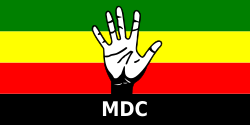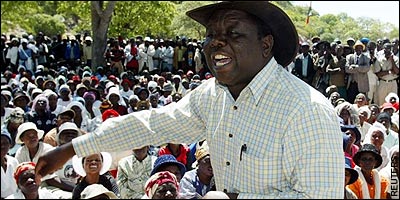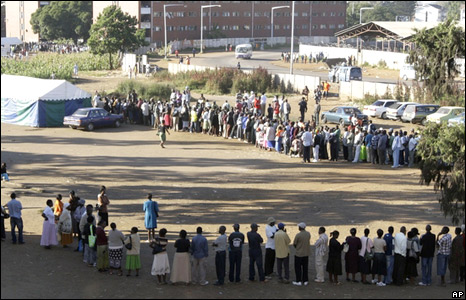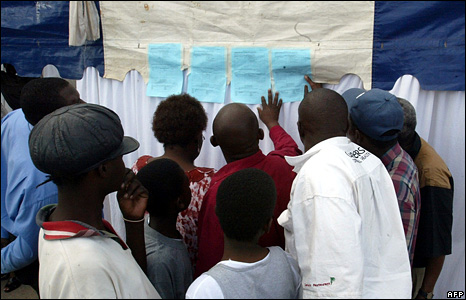Rock, Paper, Scissors

Zimbabwe went to elections last weekend. The Movement for Democratic Change use the open hand as a symbol, ZanuPF the cockerel. ZanuPF were so bereft ofideas that their slogan was “Get behind the fist” - a clear counterpoint to MDC’s open hand. That makes international opinion the Scissors - unable to conquer the Rock.
I have watched, aghast, Zimbabwe’s economic slide for 6 years. My first visit to Southern Africa was in 1999 - and I decided against visiting Zimbabwe then because my trip would have been too short. I have met many Zimbabweans in South Africa, both black and white, and they have all impressed me as intelligent, well-educated, and courteous.

Robert Mugabe is also intelligent and well-educated. Even though he delivered a magnanimous speech on taking office, telling the white Zimbabweans that they were free to stay and participate in the new Zimbabwe, I somehow feel that his hand under the podium was clenched into a fist.
A teacher by training, he invested heavily in education for his country in the first decade. In the film “Out of Africa”, Karen Blixen goes to the chief to explain she wishes to educate the workers on her farm. the chief is suspicious, and makes a mark on a tree. All children below this height could be taught - taller than that, no. So, Karen Blixen taught only the younger children. A year later, the chief formally came to her and told her that the mark no longer existed - she could teach everyone. Robert Mugabe educated his people beyond himself. He gave them and education, and then tried to take it back - independent newspapers were bombed, and repressive media laws introduced.
Mugabe always thought Zimbabwe could go back to the land. After all, his grandparents had grown mealies and had been happy - why could that not happen again ? However - he forgot about population growth - there are probably ten times as many people living on the land now. And - those people have higher expectations - they want cellphones, for instance.
Basic economics says that a country must pay for its imports, with international currency. Zimbabwe had survived, comfortably, on its agricultural output - particularly tobacco and cotton. That was the foreign currency earner that allowed the land-locked country to import diesel and cellphones.
I grew up in Kenya. My parents grew wheat, barley, pyrethrum, cattle and sheep. They sold their farm through a British Government Aid program to Kenya. The deal was that a price was agreed, the land transferred to the Kenya Government, my parents drew the money in the UK. A cooperative of 300 Kikuyus put a down payment on my fathers farm with the government. While they paid off the rest of the purchase price to the government, they were required to farm the land as my father had done - large scale agriculture.
I visited the farm 20 years later, with my brother. I talked to Mr Kamau -who had been delegated to go to Nairobi with the last payment, and returned with the title deeds to much celebration. Opinion was unanimous
- the farm was to be broken up into 3 acre plots, and each would have his own. Hence we have moved from large scale agriculture to subsistence farming. How is the country to pay for diesel and cellphones ?

Zimbabwe found out. A referendum was held in 2000, that proposed transferring the land from white farmers to landless peasants, and increasing powers for the presidency. An SMS campaign organised by the newly formed MDC defeated the referendum - the first major challenge to Mugabe’s authority. He responded by unleashing the youth brigades to invade thefarms, and telling the police not to intervene - clearly working against the wishes of the electorate that had voted in the referendum.
The presidential election held in 2002 was given thumbs-up by theSouthern African Development Community and South African observers teams. This, crucially, gave Mugabe legitimacy domestically. America and the United Kingdom thought otherwise, and imposed targeted sanctions agains Mugabe and his entourage.
A superficially popular gambit of “returning the land to the people” meant a sudden dearth of foreign currency. Inflation set in. Inflation works by robbing pensioners of their savings to fund the economy. Soon there was no more money in the pensioners accounts, and inflation climbed rapidly to 150,000 percent -banknotes with seven zeros on them, even after three zeros had been dropped in 2006. A mediation effort chaired by South Africa dragged on for most of 2007, culminating in a few paltry concessions in early 2008. What turned out to be an important one was that all votes were to be counted at the polling stations,and results posted on the door.
Ignoring SADC and Zimbabean election guidelines, Mugabe announced the election date without consultation to be March 29, and the game was on. Morgan Tsvangirai put his name on the ballot, and, to Mugabe’s suprise, so did Simba Makoni, his erstwhile financial guru, as did the leader of the breakaway MDC faction, Arthur Mutambara. Makoni’s candidature discomfited ZanuPF, as it meant they could not tar all other candidates as British stooges. It also signalled to the electorate that change was afoot. The new election laws also stated that in the event that one candidate did not reach 50% of the vote, there would be a runoff. Makoni was there to take more votes away from Mugabe, lessening his chances of achieving 50%.

Amidst many clear violations of clean elections, like equal access to the media and freedom of assembly, a partisan Electoral commission, a flawed voters roll, some observer groups arrived in the country. Western observer groups were refused accreditation. However, in contrast to the past, the MDC were allowed to campaign in the countryside.
Zimbabweans voted. Peacefully. A few people found their names not on the roll, and their was some harassment of MDC election observers, but the day came and went and SADC observers gave a qualified assent to the process. Numbers were posted on poll station doors.
Then there was silence. After polls closed on Saturday evening, it was not until Monday morning that results began to trickle out of the Zimbabwean Electoral Commission. Their website never worked - and the only results that were released were the parliamentary elections, not the presidential ones.
Election officials are under a great deal of pressure during the count. In Kenya, they cracked
- were rushed to a conclusion, and 1000 people died in the ensuing mayhem. (That clip is from the town where I grew up). But there can be no excuse for the complete silence over Presidential results. Not one single result for four days. Are they having tea in there ? To allay fears of vote-rigging, they invited observers from the parties to view the count on Tuesday -three days after polls closed.

But .. we already have all the numbers - they are just being ‘confirmed’ by the Electoral Commission. So - why don’t interested observers tally up those numbers so we can count them ourselves ? The MDC (of course) have representatives all over the country, andzimelectionresults/ also do. It is a simple matter to SMS the resultsin, and publish them.
In fact, for the Parliamentary elections, Sokwanele took zimelectionresults figures, and placed them side-by-side with the ZEC figures, in handy sortable columns so we can review the progress. Well done. I don’t need the results ‘summarised’ by anyone else - I want raw numbers I can compare with other sources.
This begs the question - why not do this for the Presidential numbers as well ? To me, it seems there is something going on behind the scenes. Diplomatic maneuvering for Mugabe’s exit ? Frantic sounds of shredding machines emanating from CIO headquarters ?
I read about a group that did election analyses, deciding whether the election was fair or not, without even being present at the election. They took all the numbers given out, and pulled off the two most significant digits. Thus 6625 renders ‘66’, 15626 renders ‘15’. they then did a statistical analysis of the double digits. It should be a smooth curve from ‘10’ down to ‘99’. When people make up numbers, they forget to conform to this curve - there will be lumps in the middle or the end. So
- no summaries, please - just the facts, Ma’am.
Desmond Tutu says that Mugabe cannot possibly claim victory after all this. He has called for African peacekeepers to be on alert. We have the memory of Kenya’s chaotic election aftermath fresh in our memories - none of that please. Zimbabweans must be commended for their calmness during this period - and the ZEC must do what they were asked to do.
My best wishes go to the Zimbabwean people. They have been asked - they answered. Mugabe must go, disappear into irrelevancy, and the hard work of picking up an economy must begin. The electoral commission might squeeze enough votes onto the ballot to force a runoff. I sincerely hope that is not the case.
First - the priority must be to return the land to its former productivity. Only then can inflation be checked - which steals everyone’s hard work. We watch for the first 100 days of MDC rule, and see what a new government can do. There is an established old guard left behind - particularly in the security forces. They must shape up, or ship out. The displaced farm workers must be found work. The draconian media laws must be repealed, and a free press allowed to restart. Radio licences should be given out, and the airwaves opened. The fresh air of information should blow through the country, so everyone knows the truth.
Good luck, Morgan.